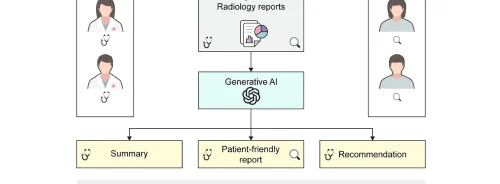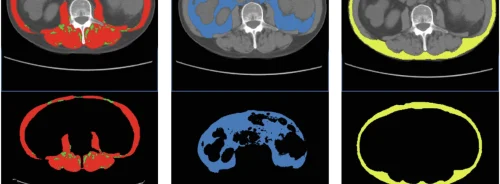A survey of primary care physicians in California, 10 months after enactment of state breast density legislation, found that nearly half of the primary care physicians who responded were not aware of breast density legislation, according to Kathleen Khong, MD, from the University of California Davis, who presented the results at the Radiological Society of North America (RSNA) annual meeting in Chicago today.
The California law, effective April 2013, includes a prescribed lay letter, which suggests discussing with their doctor the results of their mammogram and the screening options
Their electronic survey set out to investigate primary care physician awareness of the California Breast Density Notification Law and its impact on primary care practice, and was sent to 174 outpatient physicians. Questions covered awareness, perceived changes in levels of concern and comfort levels in dealing with these issues.
Nearly half of the respondent physicians (48%) said they were rarely asked about breast density, while 20% said never. Thirty-two percent noted a change in patient concern about the issue. Most were asked about getting additional screening tests because of breast density (51%), effectiveness of mammograms in dense breasts (49%) or risk of breast cancer due to dense breasts (41%). Less than one-third said they were comfortable to answer questions about breast density. Most were either “somewhat comfortable” or “not comfortable” to answer questions. Encouragingly, 75% were interested in additional background education. Twenty percent of physicians reported they had ordered supplementary screening tests for women with dense breasts who had no other breast cancer risk factors. Of those that ordered additional testing, 44% ordered Breast MRI, 22% ordered whole breast ultrasound, 11% ordered tomosynthesis, and 22% ordered other unspecified testing.
There were statistically significant differences between genders (53% of the respondents were female). Nineteen percent of males and 43% of females perceived changes in patients’ concern. Khong noted the limitations of the study being from a single academic medical centre, which has a specialty Breast Health Clinic and a dedicated breast density website linked to their electronic medical record (breastdensity.info). In addition there may be physician recall bias.
Khong concluded that enactment of breast density notification laws without providing adequate primary physician education and resources is unlikely to significantly impact patient care. Increased patient awareness will be effective only if physicians have sufficient knowledge to advise patients regarding their risk of breast cancer aand the advisability of supplemental screening. The California law will either expire or be renewed in 2019 so awareness needs to increase.
Asked by a physician from New Hampshire, which does not have legislation how to go about proactively education physicians, she recommended the resource breastdensity.info resource, which has information for radiologists, general physicians and for patients, including prepared lectures and brochures.
Claire Pillar
Managing Editor, HealthManagement
The California law, effective April 2013, includes a prescribed lay letter, which suggests discussing with their doctor the results of their mammogram and the screening options
Their electronic survey set out to investigate primary care physician awareness of the California Breast Density Notification Law and its impact on primary care practice, and was sent to 174 outpatient physicians. Questions covered awareness, perceived changes in levels of concern and comfort levels in dealing with these issues.
Nearly half of the respondent physicians (48%) said they were rarely asked about breast density, while 20% said never. Thirty-two percent noted a change in patient concern about the issue. Most were asked about getting additional screening tests because of breast density (51%), effectiveness of mammograms in dense breasts (49%) or risk of breast cancer due to dense breasts (41%). Less than one-third said they were comfortable to answer questions about breast density. Most were either “somewhat comfortable” or “not comfortable” to answer questions. Encouragingly, 75% were interested in additional background education. Twenty percent of physicians reported they had ordered supplementary screening tests for women with dense breasts who had no other breast cancer risk factors. Of those that ordered additional testing, 44% ordered Breast MRI, 22% ordered whole breast ultrasound, 11% ordered tomosynthesis, and 22% ordered other unspecified testing.
There were statistically significant differences between genders (53% of the respondents were female). Nineteen percent of males and 43% of females perceived changes in patients’ concern. Khong noted the limitations of the study being from a single academic medical centre, which has a specialty Breast Health Clinic and a dedicated breast density website linked to their electronic medical record (breastdensity.info). In addition there may be physician recall bias.
Khong concluded that enactment of breast density notification laws without providing adequate primary physician education and resources is unlikely to significantly impact patient care. Increased patient awareness will be effective only if physicians have sufficient knowledge to advise patients regarding their risk of breast cancer aand the advisability of supplemental screening. The California law will either expire or be renewed in 2019 so awareness needs to increase.
Asked by a physician from New Hampshire, which does not have legislation how to go about proactively education physicians, she recommended the resource breastdensity.info resource, which has information for radiologists, general physicians and for patients, including prepared lectures and brochures.
Claire Pillar
Managing Editor, HealthManagement
Latest Articles
Breast density, RSNA 2014, doctors, #RSNA14, awareness
A survey of primary care physicians in California, 10 months after enactment of state breast density legislation, found that nearly half of the primary car...










